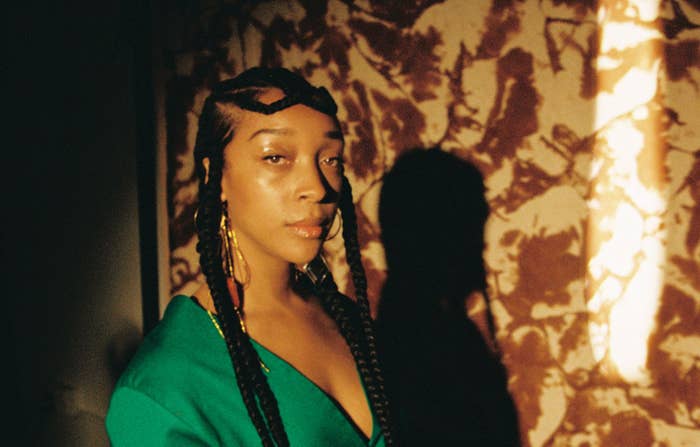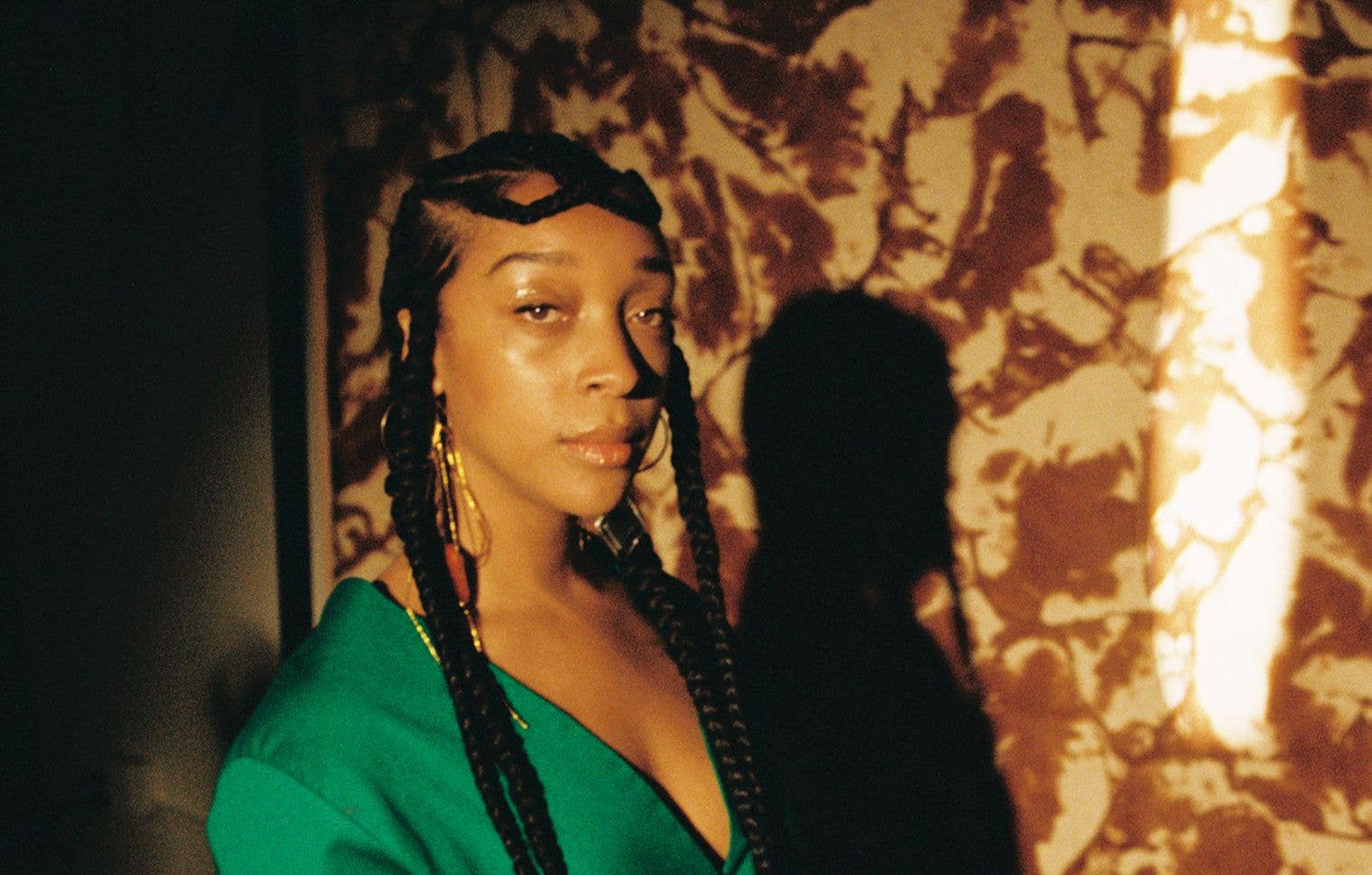
On the song “Arise”—the closing jam on Lynda Dawn’s debut EP, At First Light—an excerpt from a vintage interview with jazz vocalist Abbey Lincoln is featured. Ever grand and stately, Lincoln can be heard saying, “The singer is a storyteller and a dramatist. It’s forever; it’s infinite.”
This quote’s placement speaks not only to how Lynda sees herself as an artist, but also to her enviable palette of musical references. Beyond the surface of the British music scene, several acts of the R&B and soul tradition are forming the groundwork for a long overdue renaissance. Lynda Dawn is a gloriously proud outlier in this current class. At the core of the singer-songwriter’s aural splendour is a strong likeness to an era in R&B’s history largely untapped by today’s artists: boogie, funk, and post-disco sounds from the late 1970s and early ‘80s.
The irresistible “Move”—which recalls the songbooks of Patrice Rushen, Evelyn Champagne King and Cherelle—became Lynda’s breakthrough track in 2018, garnering early support from coveted DJs/tastemakers such as Jamz Supernova and Gilles Peterson. Her EP At First Light—housing the equally addictive earworm “Fonk Street”—soon followed, in 2019, earning widespread acclaim for its well-crafted production that beyond its sweet, throwback grooves, also weaved in flourishes of psychedelic soul, Brazilian jazz, bossa nova and gospel. Throughout 2021, Lynda’s growing base of listeners were granted the chance to witness her soul-enriching and decadent live show, adorning the festival stages of Brainchild, We Out Here and Cross The Tracks, in addition to opening up for Children Of Zeus at Electric Brixton.
It isn’t hyperbole to say that Lynda Dawn has a fruitful and long career ahead of her. We caught up with the London-based rising star to discuss her music journey thus far, what it was like growing up Pentecostal and being in a choir, Manchester’s influential boogie scene, new music and more.
“During lockdown, I educated myself on how to be more exact with my production and sound design skills, just so that I don’t always have to rely on people with my music. It’s helped open loads of doors for me to be more experimental and creative.”
COMPLEX: How, and when, did you first discover your gift of song?
Lynda Dawn: I grew up going to Worship Tabernacle, a Pentecostal church in Archway with a predominantly Nigerian parish. I joined the choir when I was only 13 years old. My mum knew that I loved to sing, but I was super shy at that age so she forced me to join. I was surrounded by seasoned musicians who were all a lot older than me; I was like a sponge back then, soaking up all the different sounds and techniques, learning how to project my voice and harmonize with others. Singing in church was an education that was both musical and spiritual.
What music do you remember playing in your family household as a child?
My dad used to be a musician. He played guitar in America with different funk bands. His taste was very eclectic; he loved jazz and folk music. My mum was more into gospel, rare groove, boogie and funk. Both my parents had amazing record collections, so music was always playing. Highlife and juju artists, like Fela Kuti and Ebenezer Obey, were a staple in my house. One of the first songs I remember my parents singing to me was Fela’s “Yellow Fever”, using the same melody and intonations but changing the lyrics to be more like a nursery rhyme.
Tell me about your initial experiences working in music professionally.
A lot of people in my church did work as background vocalists. Through them, I got into working as a session singer, and that led me to songwriting. I started what you would call a “top line career”, travelling all over the world. I lived in LA for a bit, and had management out there. I also did writing camps all over Europe. I did it for a while because I saw it as getting my foot in the door, hoping it would lead to me finally being able to be my authentic, true self. But it just kind of got more and more far away from what I wanted to do. I didn’t feel like I was doing myself justice. The kind of stuff I was being asked to do was just replicating successful songs or artists in the charts. It wasn’t very inspired. Eventually, I stopped that completely and things went quiet for a while, which led me to starting anew and forging a new beginning.
That time in your life turned out to be very instrumental in inspiring the song “Arise”, right?
I don’t think a lot of people know that “Arise” is—lyrically—a gospel song. Though I left the church around 18 years old and have a complicated relationship with the institution of church itself, I do consider myself a very spiritual person. I wrote that song to pick myself up because, at that stage in my life, I was feeling very lost and confused. One scripture that has always stayed with me is Isaiah 60:1, which says: “Arise, shine; for your light has come! And the glory of the Lord is risen upon you.” Another one that’s stayed with me is Psalm 30:5: “Weeping may endure for a night, but joy cometh in the morning.” When I became Lynda Dawn, it represented the defining of a new dawn, a fresh start. If you look at the lyrics, they’re based on those biblical passages. I was trying to uplift myself.
Unlike most contemporary R&B artists who model their sound on music from the ‘60s, ‘70s or ‘90s, a lot of your music taps into a distinct period in the R&B canon which has retrospectively been cast aside: the early ‘80s. Sonically, why was this the direction you wanted to go in with your debut EP, At First Light?
I didn’t necessarily make a choice to go for that era and try to recreate it. Those melodies and chord progressions were just what was in me. That kind of music has always resonated with me, artists like The S.O.S. Band, Gwen Guthrie, Chaka Khan and The Whispers. To this day, I’m still especially inspired by Patrice Rushen and her Straight From The Heart album. Even with a lot of the ‘90s R&B songs I liked, I always found myself preferring the original sample, like when 112 sampled Luther Vandross’ “Don’t You Know That” on “Love Me”. I can’t forget the UK either. I remember “Hangin’ On A String” by Loose Ends always being played on the way to school. Other bands like Shakatak, Fifth of Heaven and 52nd Street were also pioneers in the UK boogie scene but have now become so obscured. People sleep on Manchester especially. That city was a big hub for a lot of boogie, disco and funk in the ‘80s and it needs more recognition.
“Fonk Street” is a fascinating track due to the way the vocals are arranged: in a minimalist but precise way. With very few lyrics, the beat does the work of allowing the song to naturally breathe. What was your approach to creating that song?
One thing about a lot of my favourite boogie and funk songs is that it’s all about the subtleties; letting the groove build slowly. That song is reminiscent of bands like Kleeer. I would have to credit that arrangement to Al Dobson Jr. I always had the idea of the refrain that is repeated throughout, in there. I recorded it with my brother, Jason, who played the keys, synths and did the bassline. It was a quick session, but I planned to take it away, write a verse, add a bridge, and build on it. I’m from a gospel background so, for me, it’s always about doing more, like adding modulations and key changes. I was really trying to force more but something was telling me it was enough as it was, but I didn’t feel like people were going to get it. I sent it to Al for his thoughts and he loved it. He then stripped it back and reproduced what we recorded, and beefed it up with new 808 drums and synth pads. While I was waiting for him to send it back to me, I went to see him DJ one night in Stoke Newington and he played the song. I didn’t know it was me until the vocals came in. I was looking around at people on the dancefloor and they were all coming up to ask him who it was. Hearing it there and then, that’s when I knew we had the right formula. It was so authentic doing it that way, because testing unheard songs in the clubs is how it used to be done back in the day.
Indeed! The whimsical “Theme For Cha-Cha” is a tribute to your late father and his love for jazz music. Which jazz artists influenced you to create the ambience of that track? Is it also fair to say that Minnie Riperton, Lalah Hathaway and Rachelle Ferrell inspired your interpretation of the vocal?
That is one of the best compliments I’ve ever received, so thank you! Rachelle Ferrell is your favourite singer’s favourite singer. For that song, I was trying to channel Brazilian jazz vocalists and musicians, like Flora Purim, Airto Moreira and Tania Maria. Someone did come up to me after one of my shows saying this track was giving them Minnie Riperton vibes, so it’s funny you say that.
The project was completely made with your brother and Al Dobson Jr.—a super-tight unit allowing for a rich cohesiveness. In your opinion, how did working with a small team contribute to the quality of the final product?
My brother is my family, and Al Dobson Jr. is like family to me. Working with people who understand my references, and understand my vision, I don’t think I needed anybody else. I didn’t want to have too many cooks in the kitchen, nor did I want to be swayed by other people’s opinions. I wanted to look inward and just express myself freely without looking at what this person or that person is doing.
The artwork for At First Light, I feel like its art direction was very intentional and specific.
Avant-garde jazz artists like Alice Coltrane, Leon Thomas and Dorothy Ashby were on the moodboard. I wanted to go for something classic-looking. I didn’t want it to be about me or what I looked like—I wanted it to be about the mood of the music, something mysterious and elusive so people would be moved to find out more.



